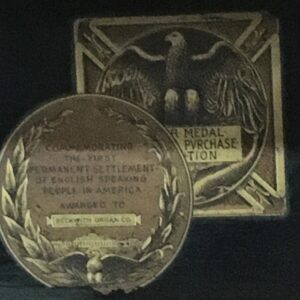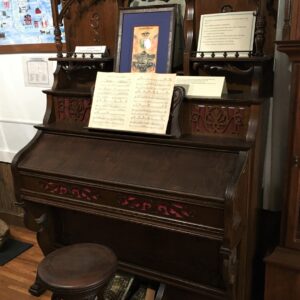View Collections | Browse Cultural Objects | Browse Oral History
Cultural Objects, Music
Beckwith Pump Organ
People
Associated Person: Dora Almeda Sowers GrahamAssociated Person: Lillian Edith Graham Reed
Date
1907Places
Sowers Mill Dam, Floyd (Courthouse District)Material/Medium
Wood, metal, glass
Specifications
- Height: 6 feet 6 inches
- Width: 44 1/2 inches
- Depth: 24 inches
Description
This pump organ was built by a subsidiary of the Sears, Roebuck Company for home use. Its case is made of solid oak with a canopy top, and decorative hand carving. “Bric-a-brac” shelves on either side of the central plate glass mirror and the stand for holding music add decorative value as well. The organ’s action and tone come from fine metal reeds, controlled by 15 stops. Decals on either side of the stops advertise the company’s 1907 Gold Medal awarded by the Jamestown Exposition. Its bellows are operated by two carpeted pedals with nickel-plated edging. One pedal’s strapping has broken. Advertised as weighing 450 pounds, these organs had to be sturdy to survive being shipped to homes by train and wagon. The Beckwith Company guaranteed their organs for twenty-five years. They also included a stool at no extra charge.
Keywords
Beckwith Organ Company, pump organ, Sears and Roebuck, parlor organBio Sketch
Dora Graham was the first owner of this parlor organ. Her daughter Lillian inherited it. Lillian Edith Graham Reed (1923-2006) and her husband Ole Peyton Reed often performed sacred music in their church and on the radio as the “Singing Reeds.”
Notes
A similar organ was advertised for $33.35 in a 1911 Sears, Roebuck catalog. At this point the company was still touting their “Gold Medal Jamestown Exhibition” as well as the “Highest Medal St. Louis World’s Fair.”






